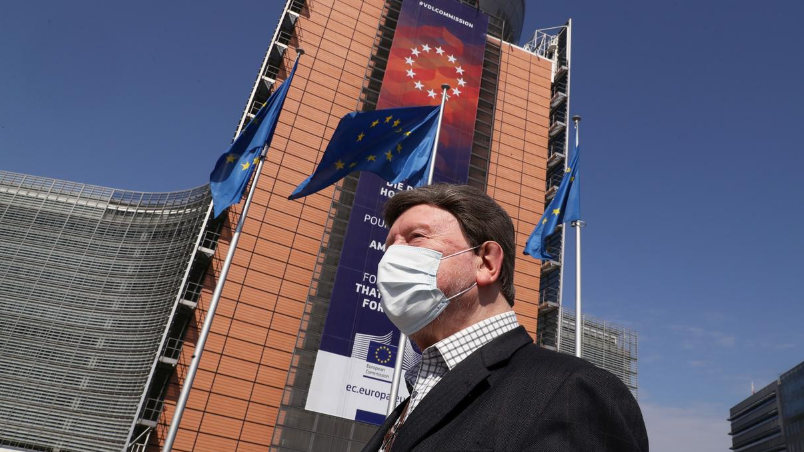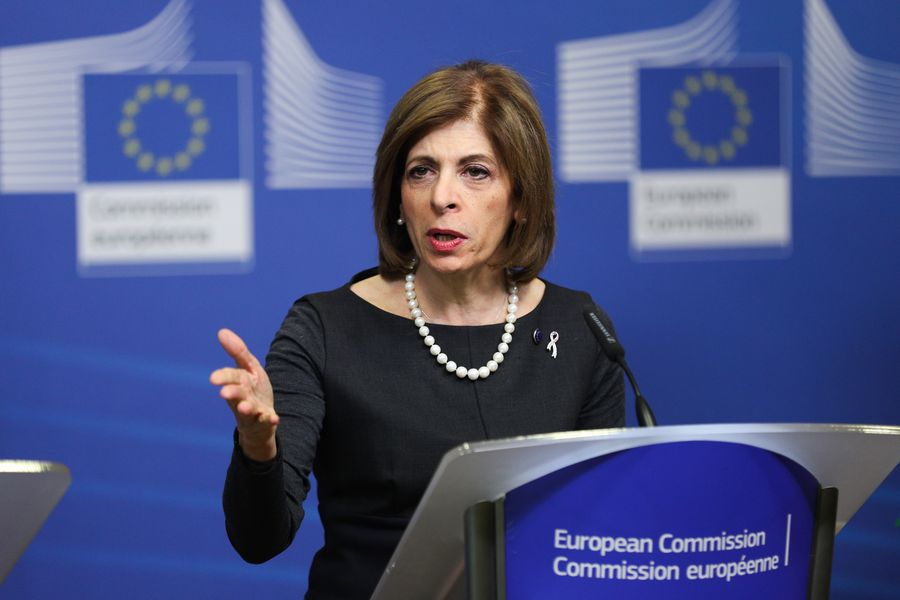
A man wearing a face mask walks past the European Commission headquarters as the spread of coronavirus disease (COVID-19) continues in Brussels, Belgium, April 9, 2020. /Reuters
A man wearing a face mask walks past the European Commission headquarters as the spread of coronavirus disease (COVID-19) continues in Brussels, Belgium, April 9, 2020. /Reuters
Editor's note: Hamzah Rifaat Hussain is a former visiting fellow at the Stimson Center in Washington, and currently serves as assistant researcher at the Islamabad Policy Research Institute (IPRI) in Pakistan. The article reflects the author's opinions and not necessarily the views of CGTN.
The European Union's deal on a comprehensive COVID-19 package for all member states has finally been passed as member states such as Italy and Spain grapple with spikes in casualty tolls, a shortage of medical supplies and stretched health infrastructures. The coronavirus package is a fiscal response to the epidemic which has swamped the continent and entails a sum of 3.2 trillion euros or 3.5 trillion U.S. dollars, which according to most estimates is the largest amount dedicated to dealing with the pandemic globally.
The swift passage of the package should have been considered a testament to the EU's collective approach towards dealing with issues affecting all member states, with the European Parliament acting as the deliberating body for legislating such matters. However, the proceedings in Brussels hinted at how Germany had to put its foot down to end opposition from the Netherlands and in the process assure Italy that the EU stands in solidarity with its disease stricken member.
In principle, a comprehensive coronavirus package should have been tabled and adopted the moment the first cases of COVID-19 were detected in Italy. What was initially witnessed however, was a complete absence of solidarity as the EU stood accused of abandoning a member state in its hour of need. This feeling of alienation is buttressed by the statement of the Italian ambassador to the bloc, Maurizio Massari, who claimed that China was the only country which responded bilaterally to Italy's dire needs.
In such pressing times, another non-EU member state, Russia proved to be an immediate responder as logistical support and medical equipment was provided to Rome. Certain EU member states had also implemented tougher border restrictions on the premise of stymying the flow of tourists into their sovereign territories as Italy was grappling with the epidemic. This alienation of Italy by the EU was a contributing factor to the spike in casualties due to COVID-19 as desperate measures centered on quick decision-making and the disbursement of aid were needed.
As hopes run high for the 3.2 trillion euro coronavirus package to materialize with far-reaching effects, it is noteworthy that initial objections by member states such as the Netherlands over the passage of the deal laid bare the lack of solidarity that the bloc has exhibited which is reminiscent of the initial stages of the epidemic in Italy when a comprehensive response was needed.

European Commissioner for Health and Food Safety Stella Kyriakides speaks at a press conference at the EU headquarters in Brussels, Belgium, February 24, 2020. /Xinhua
European Commissioner for Health and Food Safety Stella Kyriakides speaks at a press conference at the EU headquarters in Brussels, Belgium, February 24, 2020. /Xinhua
Though the Netherlands softened its stance on tough preconditions such as medical exports and border restrictions due to German and French pressure, the timing of the objections was unwarranted as it signaled calamity for the disease stricken continent. Germany had also expressed reservations over combined issued debt, a fact echoed by Northern European states which came at a time when the continent needed a comprehensive financial package which covers all elements of dealing with one of the worst global recessions in history.
Much of the mistrust surrounding debt financing by EU member countries, however, also needs to be viewed retrospectively. Member states are still wary of sharing debt financing given the horrendous experiences of the 2010 debt crisis with domestic economies gatecrashing. In the current context however, there is more to the divide than mistrust alone.
The existence of a fiscally conservative north and a largely indebted south on the continent which disagrees over terms related to accessing credit from the European Stability Mechanism (ESM) for member states as well as contingency planning after the epidemic ends has compounded the provision of relief packages. The latter has seen France vouching for approximately 3 percent of EU GDP to be available for all member states which met bitter opposition by states such as the Netherlands and Austria despite the dire need of debt issuance. Currently, the deal still does not mention joint debt issuance for financial recovery.
These fractures underline the perceived inability of the EU as a bloc to deal with emergency situations with broad financial implications. This inability can be contrasted with two important global realities amid the current pandemic. Firstly, the effect of COVID-19 has prompted stimulus packages and emergency decrees in other parts of the globe with little room for political squabbling internally. Secondly, the vacuum provided by the EU has been filled by bilateral measures undertaken by states such as China, Russia and Cuba who were cognizant of humanitarian needs of countries such as Italy.
Fiscal conservatism instead of unity on matters of financial disbursements is an anathema for a continent which is dealing with chronic issues of unemployment, shortages of medical supplies and a dilapidated health infrastructure. Europe has a history of providing humanitarian aid to conflict zones across the globe and EU member states are known for their long-standing advocacy of human rights as well as safeguarding livelihoods through extensive welfare mechanisms. Till this date, disagreements over provision of aid and the contours of debt issuance for financial recovery continue unabated.
In such pressing times, political squabbling from member states such as the Netherlands needs to pave the way for swift implementation of deals such as the 3.2 trillion euro coronavirus package that has been passed recently. Only then will member states such as Spain and Italy tackle COVID-19 with funding at their borders and resuscitate their economies whenever the epidemic ends.
(If you want to contribute and have specific expertise, please contact us at opinions@cgtn.com)